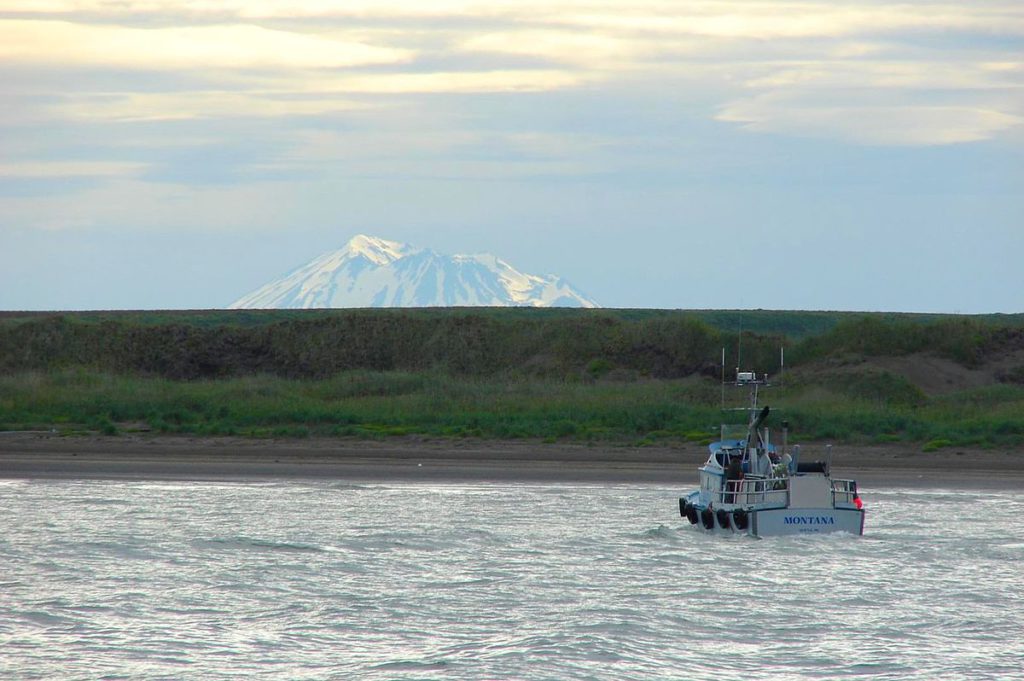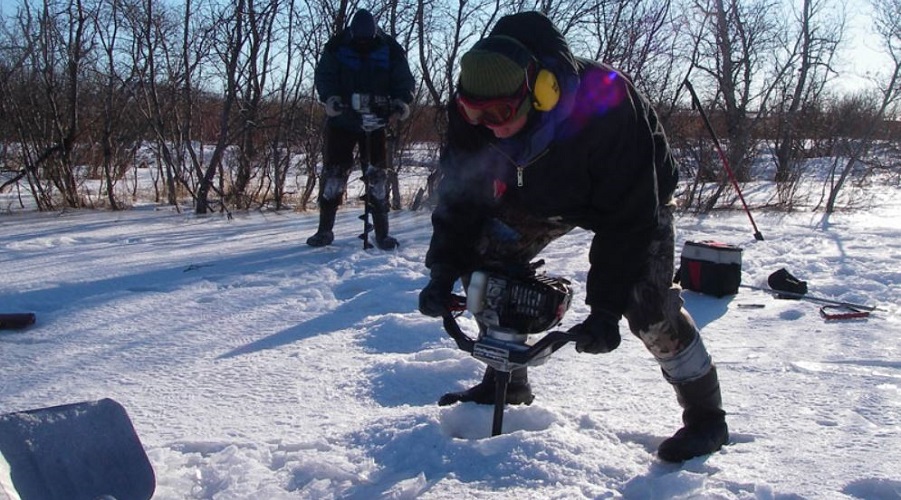Biden moves to bar mining waste in Alaska, blocking Pebble mine

Bristol Bay, Alaska. Credit: Wikimedia Commons
The Biden administration proposed a ban on waste disposal that would thwart a long-planned gold and copper mine in Alaska, citing the potential harm to the area’s thriving sockeye salmon industry.

The Environmental Protection Agency issued a formal recommendation Thursday to bar the disposal of mining waste in Bristol Bay, which hosts the world’s largest harvest of the fish. If finalized, that would effectively block efforts by Pebble Limited Partnership to extract gold, copper and molybdenum from southwestern Alaska.
Pebble, a subsidiary of publicly-traded Northern Dynasty Minerals Ltd., has been seeking to mine in the area for more than two decades.
The move represents the penultimate step in a Clean Water Act process that EPA Region 10 Administrator Casey Sixkiller said would “help protect salmon fishery areas that support world-class commercial and recreational fisheries and that have sustained Alaska Native communities for thousands of years.”
The proposed Pebble Mine has been a source of contention for years. Under former President Barack Obama, the EPA proposed restrictions that would rule out the project. But the agency later withdrew the proposed controls after a legal challenge. A federal judge last year sent the issue back to the EPA for reconsideration.
“The Biden administration has the opportunity to follow through on its commitments by finalizing comprehensive, durable protections for our region as soon as possible,” said Alannah Hurley, executive director for the United Tribes of Bristol Bay, in an emailed statement.
Conservationists have lobbied the Biden administration to definitively kill the mine by wielding the EPA’s broad authority under the Clean Water Act to veto projects involving the discharge of dredged material.
Under the recommended determination advanced Thursday, the EPA is proposing to prohibit certain waters in the Bristol Bay region as disposal sites for the discharge of dredged or fill material associated with Pebble Limited Partnership’s mine plan as well as any future proposals to construct and operate a mine tapping the same deposit.
Each year about 30 million sockeye salmon are caught in Bristol Bay. They sell at higher prices than other salmon, supporting local fisheries, processors and sports fishing companies.
(By Jennifer A. Dlouhy)
Pebble CEO criticizes US EPA veto suggestion

The area where Pebble mine would be built, 320 km southwest of Anchorage, within the Bristol Bay watershed. (Image courtesy of Northern Dynasty Minerals)
The top boss of a proposed Alaskan mine, which has been through a roller coaster of regulations for the past 15 years, called the recommendation that the US environmental agency should veto the project a “massive regulatory overreach”.

Mining waste from the Pebble Mine project, which has one of the world’s largest copper and gold deposits, would threaten Alaska’s Bristol Bay watershed, home to important salmon species including the world’s largest sockeye salmon fisheries that have supported critical wildlife and a multibillion-dollar industry, according to the Environmental Protection Agency (EPA).
Late Thursday, the EPA’s Pacific Northwest region, which includes Alaska, recommended the project should be vetoed.
In response, Pebble Limited Partnership chief executive John Shively on Friday called the EPA’s suggestion “wildly speculative” and “not supported by any defensible data”, adding the agency was acting outside the authority given to it by Congress.
The EPA did not immediately respond to a Reuters request for comment.
Pebble Limited Partnership is the main subsidiary of Canada-based Northern Dynasty Minerals Ltd.
(By Ruhi Soni; Editing by Krishna Chandra Eluri)
Will Big Oil Jump At The Opportunity To Drill More In Alaska?
- In May, the Biden administration canceled three major oil and gas auctions in the Cook Inlet.
- This week, the Interior Department announced the planned auction of more than 958,000 acres in Alaska’s Cook Inlet.
- It seems uncertain whether the Cook Inlet leases included in the December 30th auction will ever actually result in drilling.
- Environmental groups: drilling in the allotted waters would harm a number of species.
It seems like the Inflation Reduction Act does just about everything – everything, that is, but curbing inflation. In order to pass the Act the Biden administration had to appeal to a broad base of supporters, from staunch climate advocates to hardcore coal country representatives. In particular, the Act had to appeal to holdout West Virginia Senator Joe Manchin. Though Manchin is a democrat he represents a constituency that depends on fossil fuels for their livelihoods and prioritizes coal country jobs over climate measures. So while the Act includes huge incentives for clean technologies, it also promised a massive oil and gas drilling auction. Now, the time has come for the federal government to make good on that promise. This week, the Interior Department announced the planned auction of more than 958,000 acres – an area larger than the entire state of Rhode Island – in Alaska’s Cook Inlet next month. The sale includes a stretch of federal waters starting around Kalgin Island all the way to Augustine Island in the south. Department estimates say that the area being auctioned has the potential to produce nearly 200 million barrels of crude and 300 billion cubic feet of natural gas over the lifetime of the lease sales.
Set to be held on December 30, the lease sale is actually the renewal of one of several previously canceled auctions. In May, the Biden administration canceled three major oil and gas auctions in the Cook Inlet ("due to lack of industry interest in leasing in the area") and the Gulf of Mexico (due to "conflicting court rulings"). Such leases have been the subject of serious legal battles, with some rulings forcing cancellations due to insufficient consideration of the auctions’ impact on climate change, and other rulings ordering the resumption of such auctions.
While citing “lack of industry interest in leasing in the area" as a reason to cancel Cook Inlet auctions might be a convenient simplification of a larger context of political and geopolitical complications, there is also a core truth to the federal government’s statements. A controversial sale of oil and gas leases in the Arctic National Wildlife Refuge under the Trump administration fell far short of its revenue goals.
After huge publicity leading up to the highly contested sale, the auction was a dud. Not one major energy company made a bid. The government sold only half of the tracts on offer – 11 tracts of 22 – and the vast majority of the winning bids were submitted by a development corporation owned by the state of Alaska. That corporation, The Alaska Industrial Development and Export Authority, bought their 400,000 acres at the minimum bid, and has never drilled a well in its history. According to reporting from the Anchorage Daily News, the results of the sale were a “bad start” to reach anticipated revenues. “It had estimated the lease sales would bring in $1.8 billion over a decade, to be split between the Alaska and federal governments,” the report stated. “The money raised [in the auction] fell far short.”
The message seems to be that while oil and gas leases still hold major political sway, they have lost their luster in the eyes of the private sector. An opinion piece written for the Houston Chronicle at the time of last year’s “failed auction,” argued that the shocking lack of interest from anyone other than a state-owned economic development corporation signaled that the oil itself was no longer needed, but oil jobs are desperately missed.
That may no longer be the case. The context could not be more different this time around. Last year energy demand was low and reports of peak oil were high in the wake of global Covid-19 quarantines. This year, we’re in the midst of a “global energy crisis of unprecedented depth and complexity,” in the words of the International Energy Agency (IEA). The huge cutback of Russian oil and gas on the global market has left a huge vacuum and governments and consumers alike are paying the price, while Big Oil receives the windfall.
While there may be some fresh incentive for new oil and gas drilling, however, Big Oil doesn’t think that this fossil fuel renaissance is here to stay. In fact, OPEC is anticipating major decreases in demand in the coming year(s) and has responded with major production cuts to buoy oil prices. Indeed, even now it seems uncertain whether the Cook Inlet leases included in the December 30th auction will ever actually result in drilling. Already, the announcement of the sale has drawn vocal scorn from environmental groups. One such group, the Center for Biological Diversity, told Bloomberg that drilling in the allotted waters would harm a number of species, including the Cook Inlet beluga whale, one of the most endangered whale populations in the world.
It’s up in the air the way that the lease will play out, and the results will be very telling about private sector attitudes over which way the winds are blowing for Big Oil.
No comments:
Post a Comment